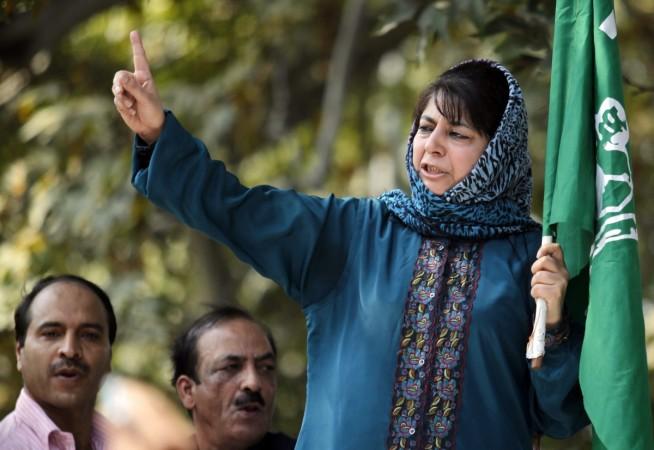
Although Assembly elections in Jammu and Kashmir are unlikely to be held any time soon, the lack of a powerful alternative to the well-entrenched regional players is worrisome for supporters of "the new political dawn in Kashmir".
There had been talk of "a new political dawn in Kashmir" after the abrogation of Article 370 last August, with the ruling BJP's central leadership the prime mover for such a change in Kashmir's political chemistry.
The NC and PDP fail in poll promises
Badly bruised and battered, the two main regional political parties, the National Conference (NC) and the Peoples Democratic Party (PDP), initially seemed to have reached the end of their road after they failed to achieve any of their poll promises.
The NC claimed it would get internal autonomy and the PDP promised self-rule.
For Kashmiris, the two slogans were alike, but both promised to keep the already existing Articles 370 and 35A beyond negotiation.
Instead of getting what they promised, the NC and the PDP were left dumbfounded when the state was bifurcated and downgraded into two Union Territories and Articles 370 and 35A thrown into the dustbin by the Parliament.
It led to a dire situation for the two parties which now had nothing to sell to the people of Kashmir who had been fed by them on the high fat diet of autonomy and self-rule.
They had promised people the heaven but even the earth under their feet had crumbled after New Delhi went forward with complete integration of Jammu and Kashmir.
The going could just not have been better for new faces with honest backgrounds and intentions to come forward and fill the void, while semi-separatism could no longer work as the separatists had already lost the plot.
Those who had joined or remained in the mainstream political camp by opposing the NC and the PDP had a future, or at least, believed that they had one.
The PDP's house fell apart brick by brick, with almost all its senior leaders, except those personally loyal to chief Mehbooba Mufti, deserting the party.

Peoples Conference President Sajad Lone, who called Prime Minister Narendra Modi his "elder brother", became a major beneficiary of the PDP's deserting flock.
This was enough for his supporters to believe that he had Delhi's blessings at a time the situation was ripe for the emergence of an alternative to the NC and the PDP.
Over a period of time, Lone's proximity to Delhi has become doubtful. The BJP allied or voted separately along with some NC councillors to oust his party leader, Junaid Azim Mattu, from Srinagar city's mayorship.
Mattu lost the vote, and the Peoples Conference appeared to have drifted away from the BJP and vice versa.
IAS topper, Shah Faesal tried his luck at what he called honest politics by formation his own party.
Initially, he seemed to gain the support of the local youth for his new political initiative, but Faesal has since drifted away from mainstream politics.
In an interview to the BBC, before he was detained, Faesal said he could no longer claim to look for a solution to the problems of Kashmiris within the framework of the Indian Constitution. His romance with mainstream politics was short-lived.
Neither Lone nor Faesal could emerge as viable alternative to either the NC or the PDP.
Altaf Bukhari, who was expelled from the PDP, has formed his JK Apni Party with participation from both the Valley and the Jammu region.
Branded "New Delhi's agent in Kashmir", Bukhari, to the discomfort of his adversaries, has successfully countered the propaganda of his adversaries.
"What have they left for me to sell to Delhi? I am not a politician. I have chosen to fight for the problems of the people and look beyond Article 370 whose abrogation I consider a great loss. But, we must move forward," he maintained. Bukhari's assertion seems well-founded since the NC and the PDP are still seeking the restoration of pre-August 5, 2019 status for J&K.
JK Apni Party, however, is a political platform in the making and to expect it to uproot the NC or whatever is left of the PDP would be expecting too much, at least of now.
There are reports that New Delhi has revived contacts with the NC. The visit of former RAW chief, A.S. Dulat to Srinagar to meet its chief, Dr. Farooq Abdullah early this year could not have happened without the Centre's explicit permission.
Dulat's assertion that he came to meet on old friend was largely seen as an old fox's ploy not to be seen to have come to stir the herd.
Both Farooq Abdullah and his son, Omar Abdullah were released from detention. Both of them said they would speak about Article's 370 abrogation and related developments when the time is right.
There was no outburst of rebellion from the father-son duo who were visibly hurt, since the NC has sided with Delhi for over 70 years but its leadership was still locked up in August last year by the Centre.
That Delhi is keeping its "hotline" alive with the NC gains credence by the fact that so far it has remained in one piece and none of its leaders has deserted the party.
Would Delhi be forced to re-negotiate its political terms with the NC without going back on Article 370's abrogation? Would grant of statehood be good enough for the NC to stand up to its promise of upholding the singularity of Kashmir in the eyes of its supporters?
Both these look far-fetched, but politics has always been the art of the possible. No crystal ball gazing can reveal the answer to whether or not the NC would be ready to take its new avatar by giving up on its 70-year-long promises to Kashmiris.








